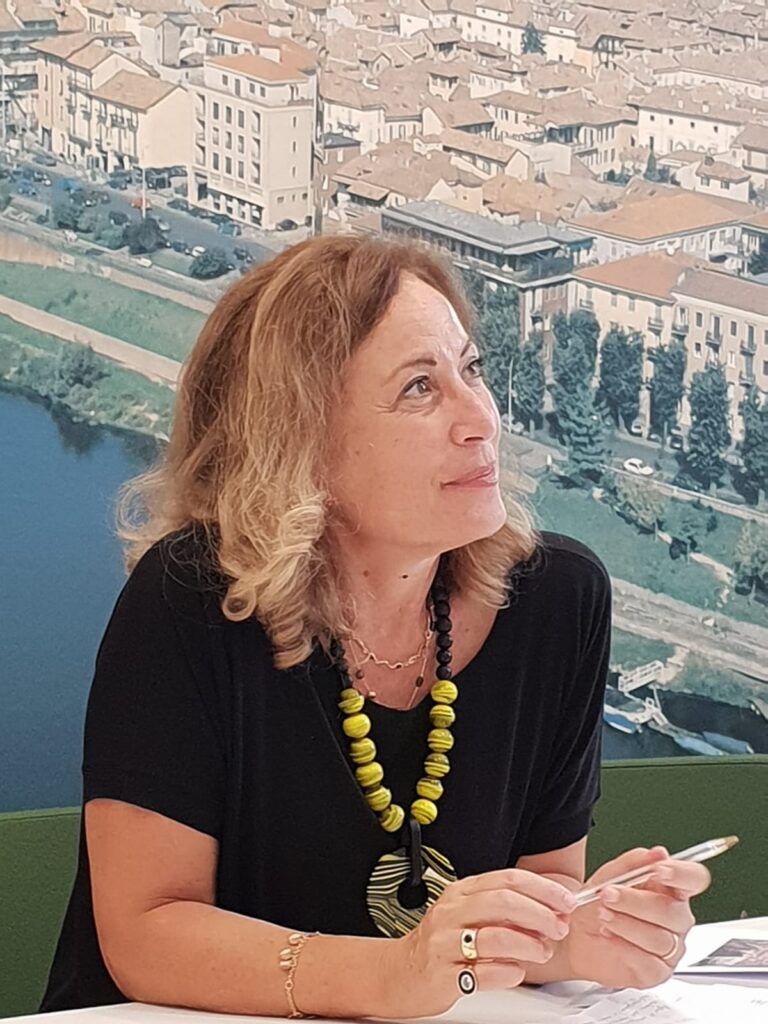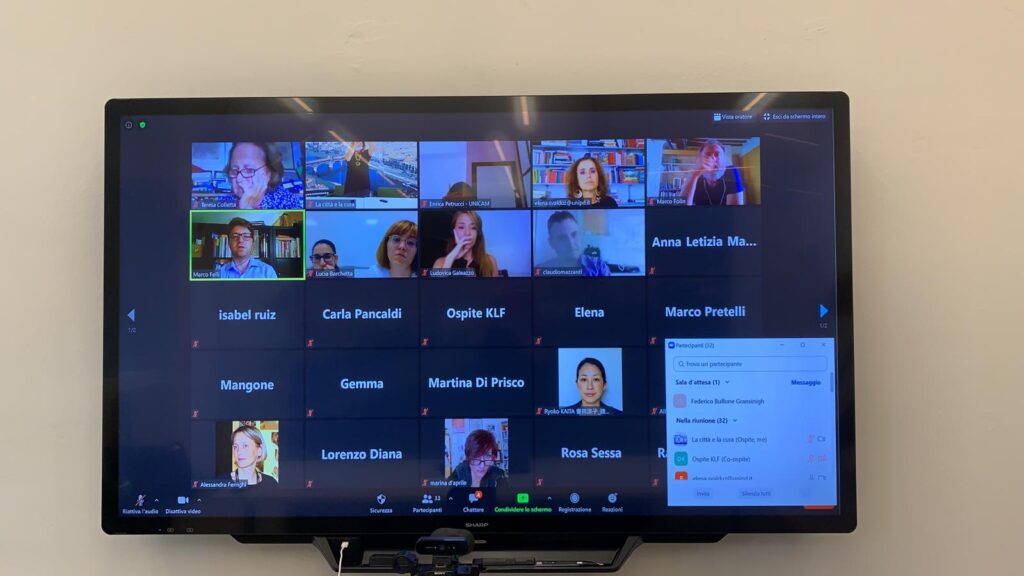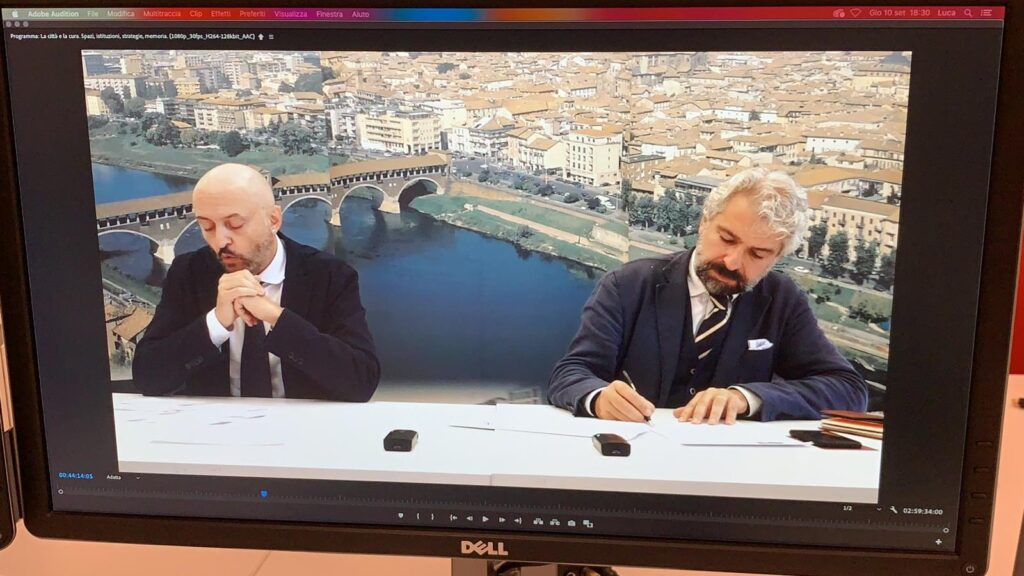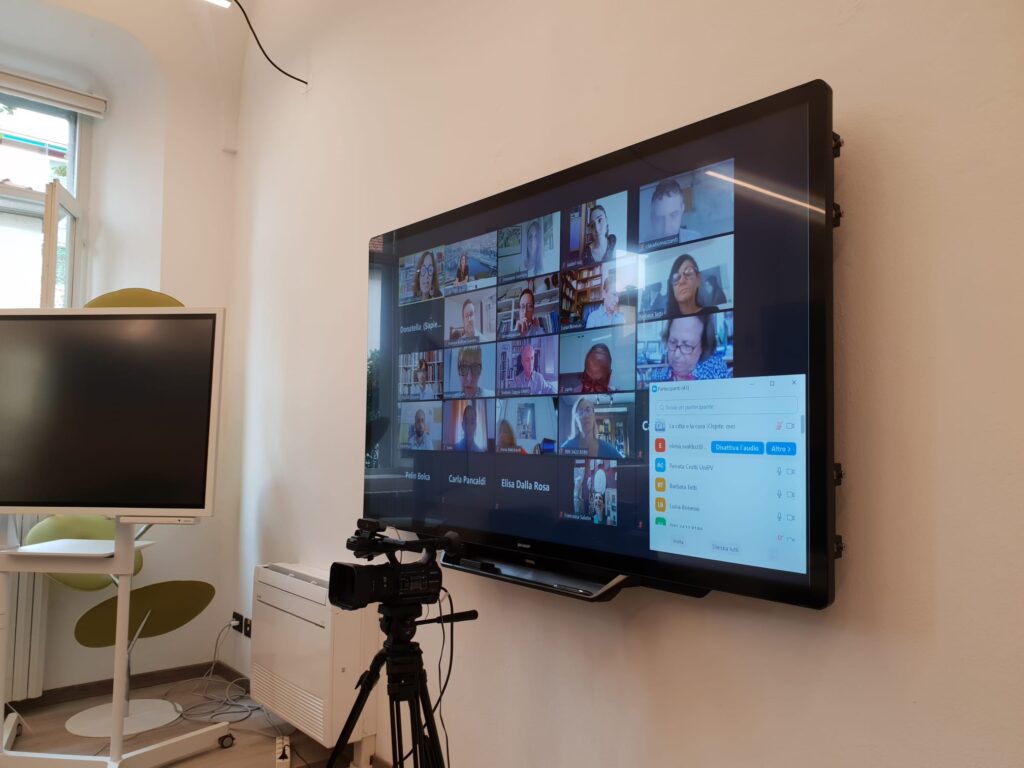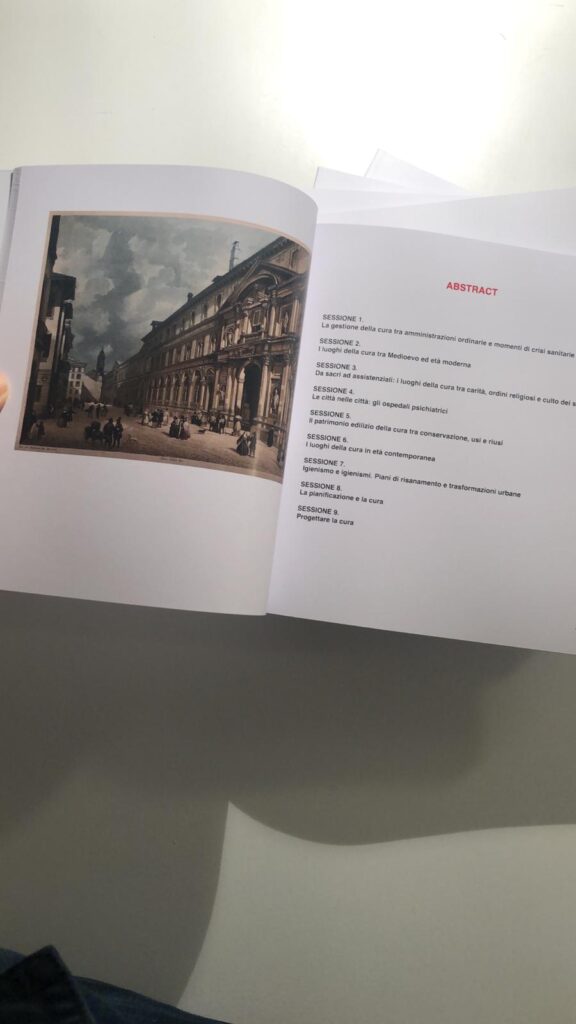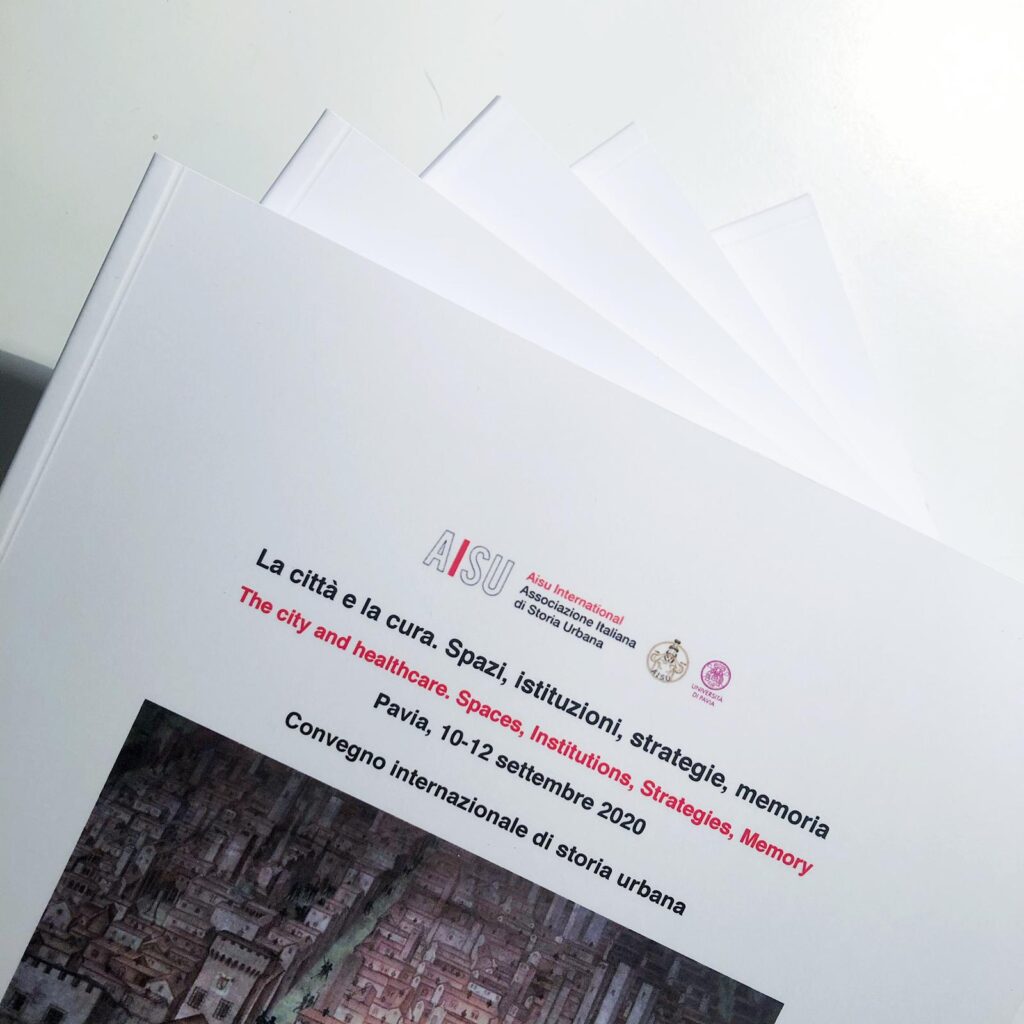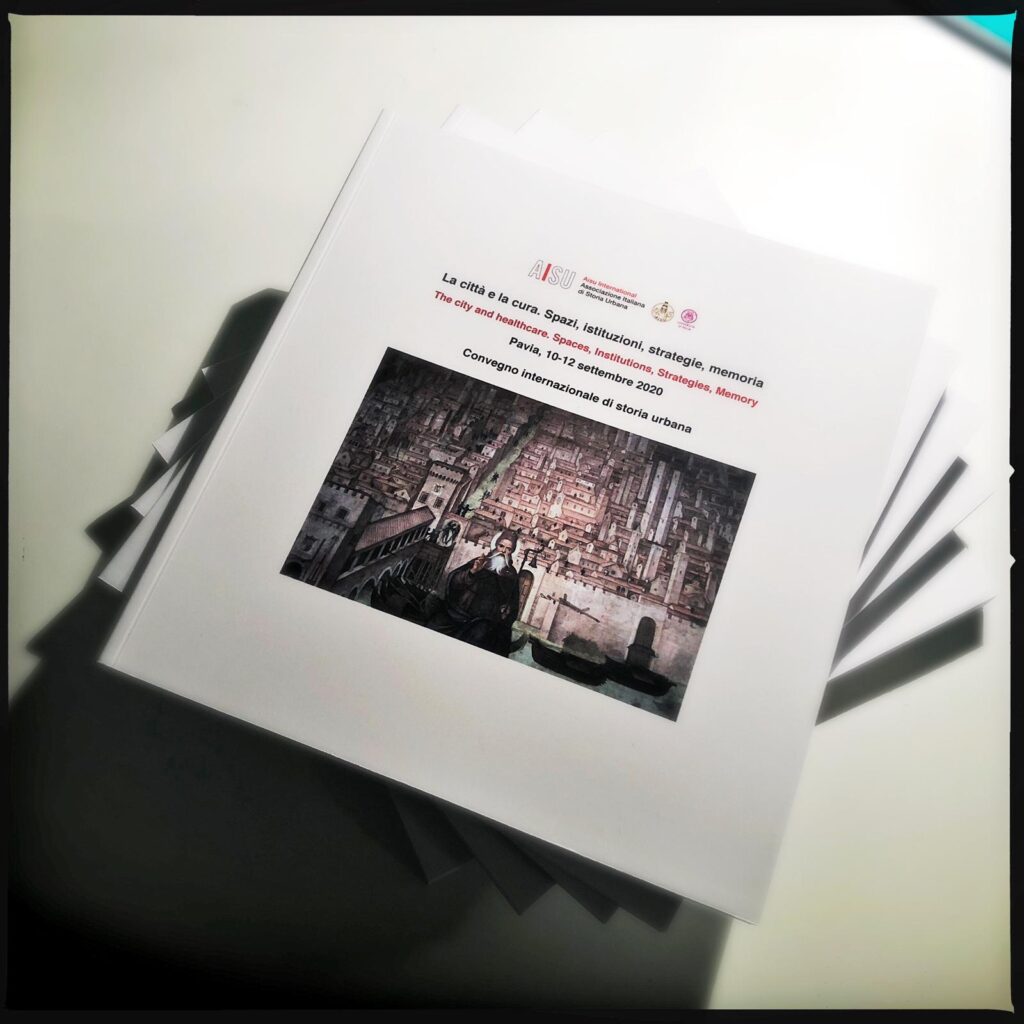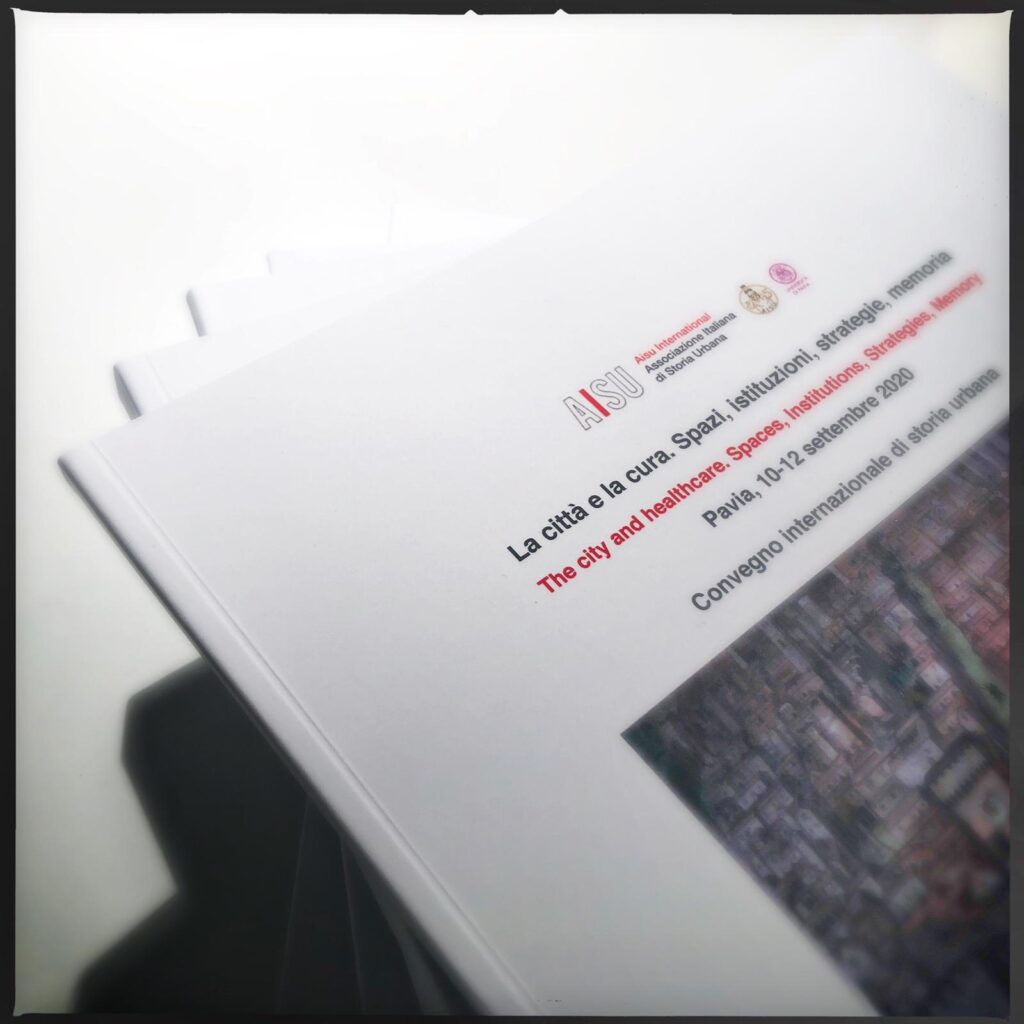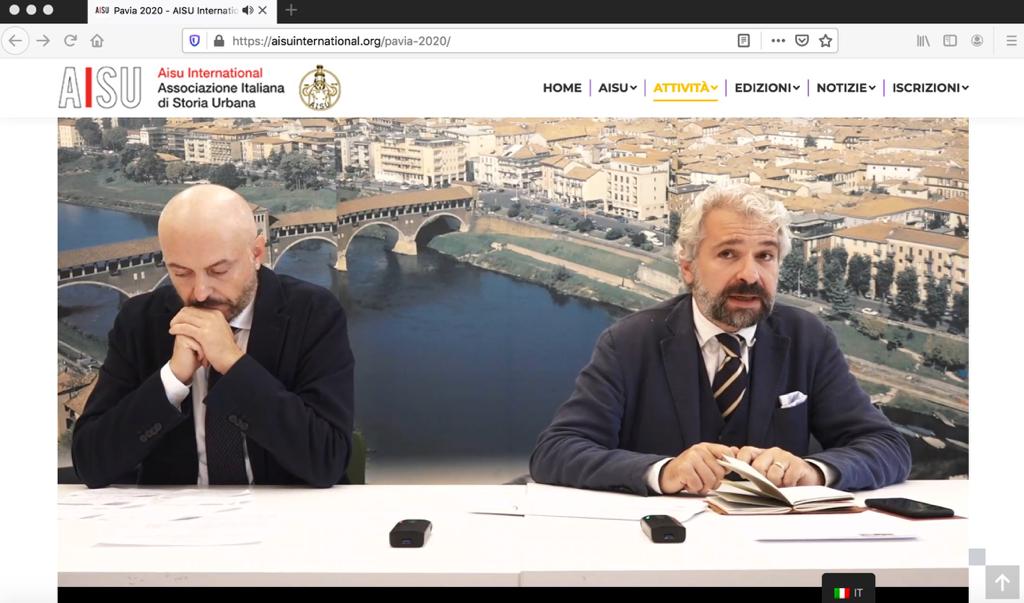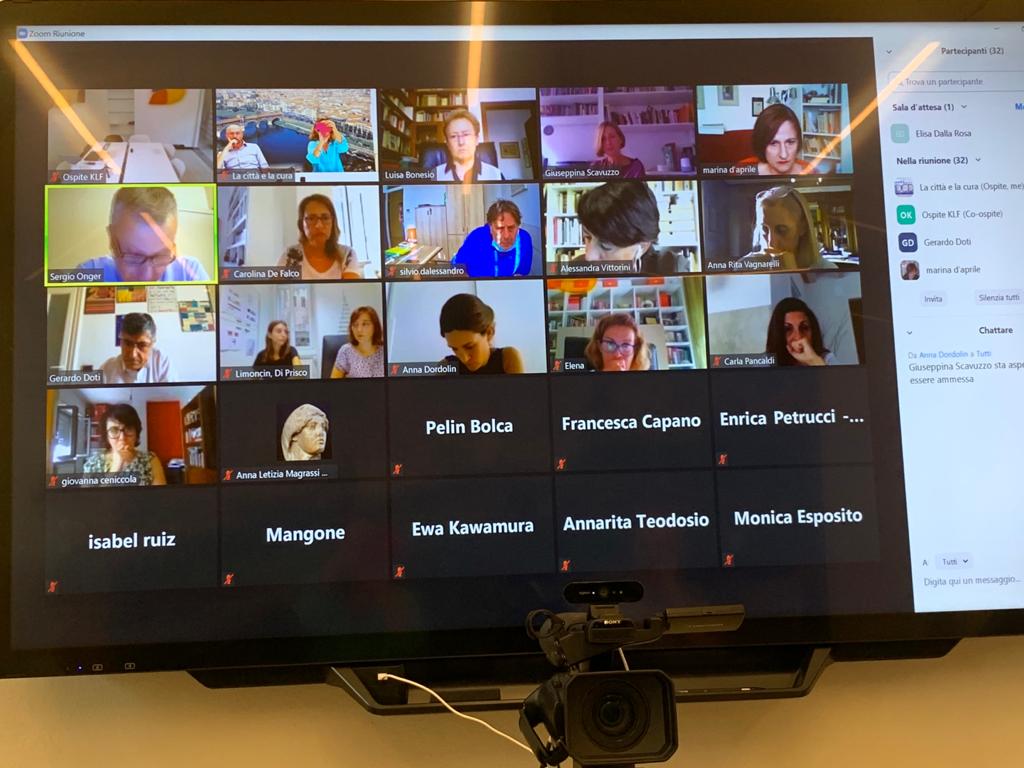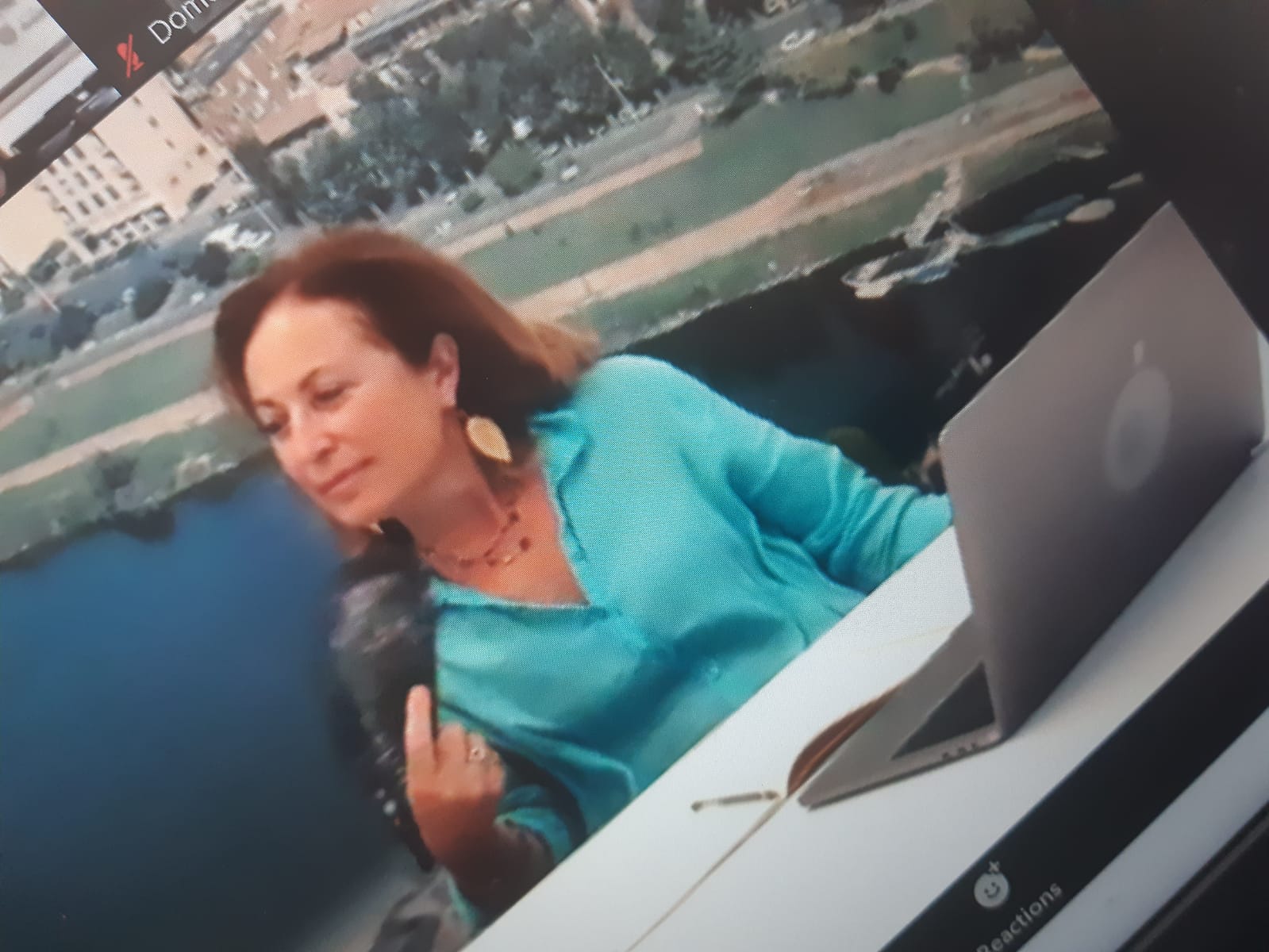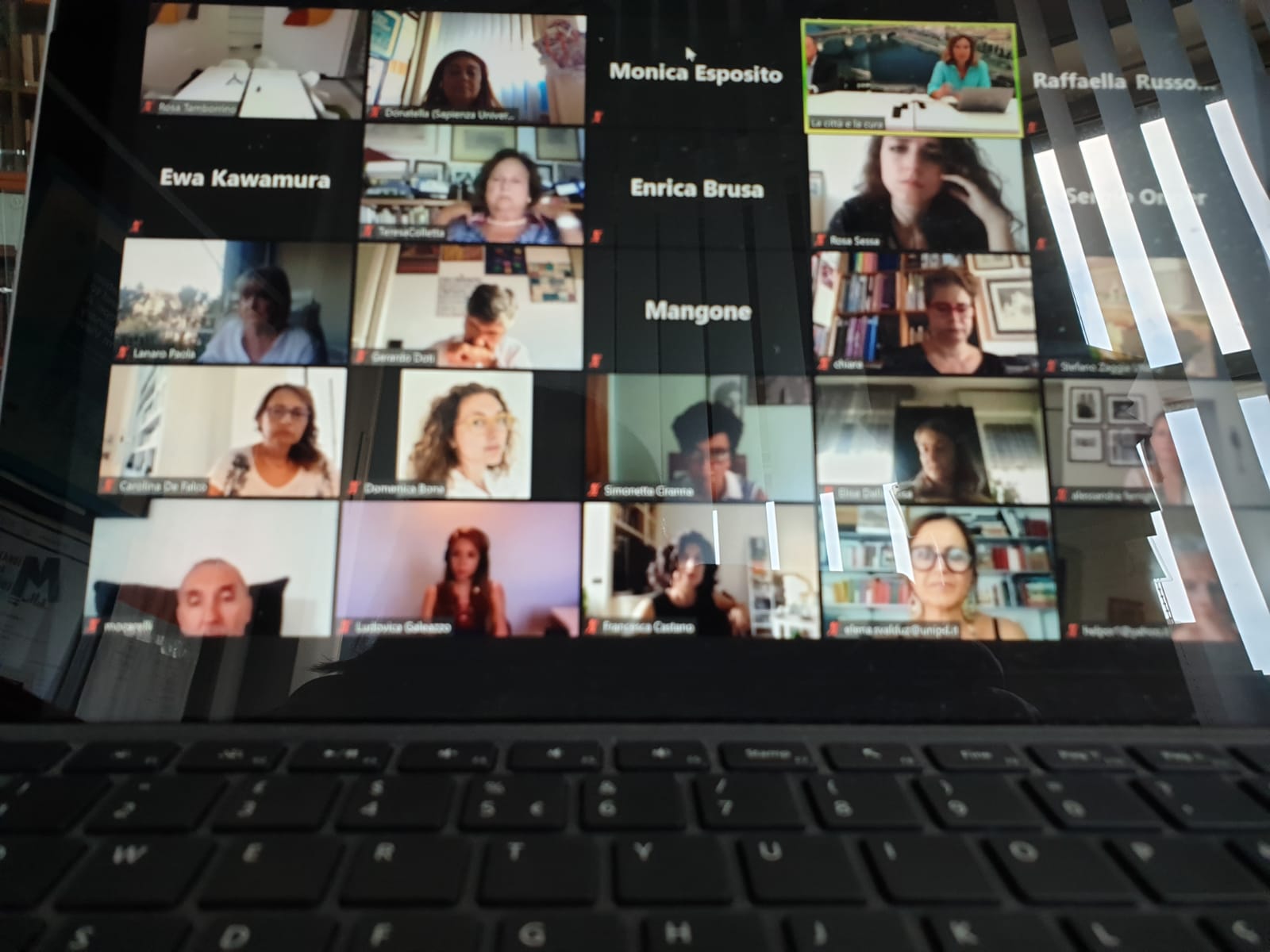The city and healthcare. Spaces, Institutions, Strategies, Memory.
10-11-12 September 2020

Presentation
Our society would seem to be at a crossroads: on the one hand, healthcare has become an indispensable activity intended to overcome the maladies and limitations afflicting humans, on the other, the right to such care is not yet equitably provided for, and is today, moreover, compromised even where it previously appeared firmly established.
The city has always been a privileged place for medical treatment, although it has also been perceived (in some historical moments) as the place where the body fell ill. On the other hand, it has developed suitable tools and spaces in which to find remedies for diseases. Political, institutional, cultural and scientific changes have led to ancient and new spaces in cities dedicated to therapies and well-being. From religious to scientific, the vision and organization of care as a social and cultural theme have generated - in different eras - ways, strategies, practices and habits that have influenced the large scale of urban history, as well as the developments and transformations of different places designated in the cities, or alternatively excluded from the cities. Gender separations, internments of special patients, distinctions connected to religions, ethnic groups or ages, specializations of functions, constraints and emancipations in the forms of active and passive care, liberality, privileges and elites, have found specification in times and places, connoting cities . In some cases, the importance of these functions has become such as to require a specialization of some urban parts, increased by the convergence between the science of care and places of processing and transmission of medical knowledge. In this context, the recent debate on health citadels for the definition of new functions that entire urban parts can take on should also be framed.
If medical science and treatments have profoundly changed and ancient beliefs are revolutionized, the past of treatments is strongly connected to the present of cities, even more so if these are marked by pandemics such as the one we are experiencing from COVID-19. The study of spaces and strategies related to the role played by the city in this field is also an opportunity to increase knowledge of a specific cultural heritage of the past, often still in use, sometimes of considerable artistic importance, but more often perceived as obsolete. for its historical and cultural meanings. This tangible heritage is joined by the intangible heritage of a history strongly linked to the community and its well-being, in the past and in the present, and therefore intertwined with social and cultural tensions, and with their representation.
At a time when the global tragedy of the pandemic is being experienced, this conference intends to promote a diachronic reflection on the themes and places of treatment, from late medieval cities to contemporary cities. Scholars have formulated proposals on case studies or on cross-cutting topics, through various disciplinary or interdisciplinary perspectives, with the aim of broadening the status of studies in the subject by articulating the field of urban history. The contributions deal with issues ranging from issues related to care (such as isolation, charity, scientific organization, etc.), to spatial and distributive elements or architectural typologies (e.g. the pavilions, the ward, the chapel, etc.), social practices (e.g. with respect to lifestyles, disabilities, or certain rituals), cultural (see the phenomenon of health care), institutional and administrative practices in ordinary and extraordinary management (e.g. in cases of epidemics or catastrophic events), the impact on neighborhoods or specialized urban areas (e.g. polyclinics).
This conference as a whole aims to bring out different forms of attention and conception of care - analyzed at different moments from prevention, to therapies, to emergencies, to rehabilitation, to hospitalization - in different eras and in different geographical and cultural contexts. in relation to urban history. In this sense, in the selection of the contributions, the possibility of articulating the interventions - many of significant relevance - was also taken into account in order to account for chronologies, cities of different sizes, case studies, research areas.
New modalities
The conference is carried out remotely. This is a contingent necessity, but which has been interpreted as a challenge, rather than a renunciation, for both the AISU and the University of Pavia.
For this reason, AISU and the University of Pavia offer an online conference format with:
• tight times for oral communication;
• integration of remote live communications and pre-produced video content and broadcast during the event;
• methods of remote interaction;
• possibility to download abstracts of the contents, reserved for convention members;
• “out of the box” contributions from scholars and personalities outside the scientific disciplinary perimeter of the congress but such as to make a useful contribution of vision and perspective.
Most of the contributions of the conference participants are pre-recorded on video and can be viewed on the AISU website: https://aisuinternational.org/pavia-2020/. The videos are accessible, by logging in, to AISU Members in good standing with the quotas, before, during and after the conference, and to those Registered at the conference, before and during the conference; while they will be accessible to all only during the 3 days of the conference.
During the three days, over 130 scholars from Italian and international universities, institutions and companies will be connected.
During the three days, scholars connected remotely will animate 9 thematic round tables dedicated to the theme of the city and care from the past to the contemporary: 1: The management of care between ordinary administrations and moments of health crisis; 2. The places of care between the Middle Ages and the modern age; 3. From sacred to welfare: the places of care between charity, religious orders and cult of saints; 4. Cities within cities: psychiatric hospitals; 5. The building heritage of care between conservation, uses and reuses; 6. The places of care in the contemporary age; 7. Hygiene and hygiene. Urban rehabilitation and transformation plans; 8. Planning and care; 9. Design the cure.
The universities, institutions, companies involved are: Italian: Università di Pavia; Università Bicocca di Milano; Università Ca’ Foscari di Venezia; Sapienza Università di Roma; Università di Napoli Federico II; Scuola Normale Superiore di Pisa; Università Iuav di Venezia; Università di Padova; Università di Brescia;Università di Palermo; Università di Bologna, Università G. d’Annunzio Chieti-Pescara; Politecnico di Milano; Politecnico di Torino; Università di Salerno; Collegio Ghislieri-Istituto Universitario di Studi Superiori di Pavia; Università di Verona, Università della Campania Luigi Vanvitelli; Università di Catania; Università di Genova; Università dell’Aquila, Università di Camerino; Università Politecnica delle Marche; Università di Cagliari; Università di Trieste; Università del Molise; Università Kore di Enna; Università di Bergamo; Università degli Studi di Perugia; Dottorato del corso di Studi Storici, geografici e antropologici delle Università di Padova, Venezia e Verona; Soprintendenza Archeologia, Belle Arti e Paesaggio per le province di Cremona, Lodi e Mantova; Soprintendenza Archeologia, Belle Arti e Paesaggio per la città dell’Aquila e per i comuni del Cratere; Soprintendenza Archeologia Belle Arti e Paesaggio per le province di Frosinone, Latina, Rieti e Viterbo; Consiglio Nazionale delle Ricerche, Avellino; Istituto per le Tecnologie della Costruzione, Consiglio Nazionale delle Ricerche, L’Aquila; Fondazione Giorgio Cini onlus, Venezia; Archivio Diocesano dei Marsi “Angelo Melchiorre”, Diocesi di Avezzano; Museo dei Sanatori di Sondalo; LINKS Foundation; Dipartimento Salute Mentale ASLU 1 Umbria. Foreigners: I Tatti, The Harvard University Center for Italian Renaissance Studies; Universidade Federal de Alagoas; Universidade do Estado da Bahia; Universitat de València; Universidad de Sevilla; Atomi University di Tokyo; Universitat de Barcelona; Pontificia Università Cattolica di Campinas, San Paolo, Brasile; Comal.Ch.
Those registered for the conference will receive a private email containing by Wednesday 8 September 2020 the link to Zoom Application to attend all the works scheduled from 10 to 12 September 2020.
Program
FIRST DAY
September 10, 2020
Ore 9,30-9,45
Salute of welcome
Francesco Svelto
Rector of the University of Pavia
Lalo Magni
President, Faculty of Engineering of the University of Pavia
Alessandro Reali
Director of the Department of Civil Engineering and Architecture of the University of Pavia
9,45-10,00
Rosa Tamborrino
President of AISU (Italian Association of Urban History), Polytechnic of Turin
The city, urban history and the commitment to care
10,00-10,15
Marco Morandotti, Massimiliano Savorra
Università di Pavia
The city and care: historical research and the intertwining of knowledge in times of crisis.
The reasons for a conference
10,15-10,30
Keynote speach
Paolo Mazzarello
President of the University Museum System, University of Pavia
Camillo Golgi inspirer of large health facilities
10,30-10,45
Dialogue on emergency health management
Fausto Baldanti (Fondazione IRCCS Policlinico San Matteo-Università di Pavia)
Francesco Rigano (President of EDiSU, University of Pavia)
The city of collegiate communities in a pandemic: the Pavia experience
10,45-11,00
Break
11,00-13,00
ROUND TABLE 1: The management of care between ordinary administrations and moments of health crisis
Discussant: Paola Lanaro (Università Ca’ Foscari di Venezia), Luca Mocarelli (Università Bicocca di Milano)
Participants:
1.1 Renata Crotti (Università di Pavia), 1.2 Benedetto Ligorio (Sapienza Università di Roma), 1.3 Ludovica Galeazzo (Villa I Tatti, The Harvard University Center for Italian Renaissance Studies), 1.4 Francesco Mazzucotelli (Università di Pavia), 1.5 Valeria Pagnini (Università di Napoli Federico II), 1.6 Gabriella Restaino (Universidade Federal de Alagoas), Lysie dos Reis Oliveira (Universidade do Estado da Bahia), 1.7 Francesca Ferrando (Dottorato del corso di Studi Storici, geografici e antropologici delle Università di Padova, Venezia e Verona), 1.8 Giulio Ongaro (Università di Milano Bicocca), 1.9 Ileana Tozzi (Soprintendenza Archeologia Belle Arti e Paesaggio per le province di Frosinone, Latina, Rieti e Viterbo), 1.10 Sergio Onger (Università di Brescia), 1.11 Samuel Boscarello (Scuola Normale Superiore di Pisa), 1.12 Sonia Salsi (Università di Bologna), 1.13 Marco Morandotti, Alessandro Greco, Daniela Besana (Università di Pavia)
13,00-15,00
Lunch breack
15,00-17,00
ROUND TABLE 2. The places of care between the Middle Ages and the modern age
Discussant: Donatella Calabi (Università Iuav di Venezia), Renata Crotti (Università di Pavia)
Participants:
2.1 Elena Svalduz (Università di Padova) 2.2 Isabel Ruiz Garnelo (Universitat de València), 2.3 Carlos Plaza (Universidad de Sevilla), 2.4 Emanuela Garofalo (Università di Palermo), 2.5 Daniele Pascale Guidotti Magnani (Università di Bologna), 2.6 Ivana Quaranta (Indipendent research), 2.7 Barbara Tetti (Sapienza Università di Roma), 2.8 Federico Bulfone Gransinigh (Università G. d’Annunzio, Chieti-Pescara), 2.9 Carlos Alberto Cacciavillani, Claudio Mazzanti (Università G. d’Annunzio, Chieti-Pescara), 2.10 Stefano Zaggia (Università di Padova), 2.11 Gianpaolo Angelini (Università di Pavia)
17,15-17,30
Break
17,30-18,30
ROUND TABLE 3. From sacred to welfare: the places of care between charity, religious orders and cult of saints
Discussant: Marco Folin (Università di Genova), Elena Svalduz (Università di Padova)
Participants:
3.1 Bruno Di Gesù (Sapienza Università di Roma), 3.2 Marco Felli (Università dell’Aquila), Eleonora Di Cristofano (Archivio Diocesano dei Marsi “Angelo Melchiorre”, Diocesi di Avezzano), 3.3 Italia Caradonna (Università della Campania Luigi Vanvitelli), 3.4 Enrica Petrucci, Diana Lapucci, Lucia Barchetta, Noemi Lapucci (Università di Camerino), 3.5 Vanessa Martín Nicolás (Universitat de Barcelona)
Immagini della prima giornata
SECOND DAY
11 September 2020
9,30-11,00
ROUND TABLE 4. Cities within cities: psychiatric hospitals
Discussant: Gerardo Doti (Università di Camerino) Sergio Onger (Università di Brescia)
Participants:
5.1 Marina D’Aprile, Elena Manzo (Università della Campania Luigi Vanvitelli), 5.2 Giuseppina Scavuzzo (Università di Trieste), 5.3 Martina Di Prisco, Anna Dordolin, Paola Limoncin (Università di Trieste), 5.4 Alessandra Vittorini Giovanna Ceniccola, Carla Pancaldi (Soprintendenza Archeologia, Belle Arti e Paesaggio per la città dell’Aquila e per i comuni del Cratere), 5.5 Anna Rita Vagnarelli (Università degli Studi di Perugia), Silvio D’Alessandro (Dipartimento Salute Mentale ASLU 1 Umbria), 5.6 Clara Verazzo, Martina Nardis (Università G. d’Annunzio, Chieti-Pescara), 5.7 Carolina De Falco (Università della Campania Luigi Vanvitelli)
11,00-11,15
Break
11,15-11,30
Out of box video intervention
Luisa Bonesio (Museo dei Sanatori di Sondalo)
The Sanatorium Museum of Sondalo. Enhancement of an architectural identity
11,30-13,30
ROUND TABLE 5. The building heritage of care between conservation, uses and reuses
Discussant: Alessandro Greco (Università di Pavia), Marco Pretelli (Università di Bologna)
Participants:
5.1 Leila Signorelli (Università di Bologna), Chiara Mariotti (Università Politecnica delle Marche), 5.2 Marco Pretelli (Università di Bologna), Poalo Clini, Antonello Alici, Chiara Mariotti (Università Politecnica delle Marche), 5.3 Pierfrancesco Cherchi, Caterina Giannattasio, Marco Lecis (Università di Cagliari), 5.4 Adriana Marra (Istituto per le Tecnologie della Costruzione, Consiglio Nazionale delle Ricerche, L’Aquila), Giovanni Fabbrocino (Università del Molise), 5.5 Antonella Versaci, Luca Renato Fauzia (Università Kore di Enna), Alessio Cardaci (Università di Bergamo), 5.6 Martina Ramella Gal, Silvia Summa (LINKS Foundation), 5.7 Ana Paula Farah, Anamaria Canuto Sales de Oliveira (Pontificia Università Cattolica di Campinas, San Paolo, Brasile), 5.8 Alessandro Greco, Daniela Besana, Valentina Giacometti (Università di Pavia), Luca Frigerio (Indipendent research), 5.9 Sara Di Resta, Giorgio Danesi (Università Iuav di Venezia), 5.10 Giulia Favaretto, Marco Pretelli (Università di Bologna), 5.11 Renata Crotti (Università di Pavia), 5.12 Anna Letizia Magrassi Matricardi (Università di Pavia), 5.13 Marco Morandotti, Anna Dell’Amico, Hangjun Fu, Sandro Parrinello (Università di Pavia)
13,30-15,30
Lunch breack
15,30-17,30
ROUND TABLE 6. The places of care in the contemporary age
Discussant: Donatella Strangio (Sapienza Università di Roma), Guido Zucconi (Università Iuav di Venezia)
Participants:
6.1 Mariagrazia L’Abbate (Soprintendenza Archeologia, Belle Arti e Paesaggio per le province di Cremona, Lodi e Mantova), 6.2 Monica Esposito (Università di Napoli Federico II), 6.3 Elena Serina (Dottorato della Scuola Superiore Meridionale di Napoli), 6.4 Francesca Capano (Università di Napoli Federico II), 6.5 Raffaella Russo Spena (Università di Napoli Federico II), 6.6 Ewa Kawamura (Atomi University di Tokyo), 6.7 Enrica Brusa (Politecnico di Milano), 6.8 Simona Talenti, Annarita Teodosio (Università di Salerno), 6.9 Daniela Stroffolino (Consiglio Nazionale delle Ricerche, Avellino), 6.10 Antonino Margagliotta, Paolo De Marco (Università di Palermo), 6.11 Elisa Dalla Rosa (Università di Verona), 6.12 Francesca Salatin (Fondazione Giorgio Cini onlus, Venezia), 6.13 Rosa Sessa (Università di Napoli Federico II)
17,30-19,00
AISU members assembly
Immagini della seconda giornata
THIRD DAY
12 September 2020
9,30-10,45
ROUND TABLE 7. Hygienism and hygiene. Urban rehabilitation and transformation plans
Discussant: Salvo Adorno (Università di Catania), Fabio Mangone (Università di Napoli Federico II)
Participants:
7.1 Guido Zucconi (Università Iuav di Venezia), 7.2 Elena Manzo (Università della Campania Luigi Vanvitelli), 7.3 Andrea Maglio (Università di Napoli Federico II), 7.4 Roberta Gambardella (Università di Napoli Federico II), 7.5 Paola Barbera (Università di Catania), 7.6 Alessandra Ferrighi (Università Iuav di Venezia), 7.7 Ermanno Bizzarri (Università di Napoli Federico II)
10,45-11,00
Break
11,00-12,00
ROUND TABLE 8. Planning and care
Discussant: Roberto De Lotto (Università di Pavia)
Participants:
8.1 Giovanni Spizuoco (Università di Napoli Federico II), 8.2 Pelin Bolca (Politecnico di Torino), 8.3 Gemma Belli (Università di Napoli Federico II), 8.4 Roberto De Lotto, Elisabetta Maria Venco, Caterina Pietra (Università di Pavia), 8.5 Stefano De Falco (Università di Napoli Federico II)
12,00-12,15
Break
12,15-13,30
ROUND TABLE 9. Planning the cure
Discussant: Daniela Besana (Università di Pavia), Francesco Polverino (Università di Napoli Federico II)
Participants:
9.1 Daniela Besana, Alessandro Greco, Andrea Chiesa (Università di Pavia), 9.2 Massimo Triches (Università Iuav di Venezia), 9.3 Alessandro Marata (Università di Bologna), 9.4 Giovanni Comi (Politecnico di Milano), 9.5 Vincenzo Valentino (Università di Napoli Federico II), 9.6 Francesca Castanò, Michela Carlomagno, Rosanna Veneziano (Università della Campania Luigi Vanvitelli), 9.7 Federica Corso Talento (Comal.Ch), 9.8 Lorenzo Diana, Francesco Polverino (Università di Napoli Federico II)
Link to videos
The contributions of the participants to the conference pre-recorded in video can be viewed by logging in to the AISU website: the videos are accessible to AISU Members in good standing with the quotas (before, during and after the conference) and to those Registered at the conference (before and during the conference). LINK TO THE VIDEOS' PAGE
Only during the 3 days of the conference will the videos be made visible to all, subsequently they will be part of the AISU archive.
Call for Abstract
The deadline for submitting abstracts is postponed to June 15th. The abstracts will be selected by the scientific committee, which will communicate acceptance by July 10th . The authors will confirm their participation by registering by July 20thThe final calendar will be announced by August 10th.
- The authors of the accepted abstracts will present their work, according to the duration, modalities and calendar of the nuovo new format, sending in advance the materials that will be projected / shared (max duration of each intervention 15 minutes and space for discussion and response to the questions)
- At the same time, the authors of the accepted abstracts will be invited to submit the complete essay written according to the editorial rules which must be received in final form by November 30th. The essay delivered will be submitted to the referee according to the Double Peer Review system for publication. The accepted essays will be published in the AISU series (Urban History and Insights).
Scripts of two types are envisaged: a general paper or a poster designed to exemplify a case study. The abstracts must specify the type of contribution and be of between 2,000 and 4,000 characters in length. The abstracts must be accompanied by a brief biographical profile of the author of no more than 1,000 characters in length. The contributions accepted by the editorial board will be published after being presented and discussed at congress, subject to peer review and revised accordingly for publication. The authors undertake to provide the unpublished text and illustrations (free of copyright) drawn up according to the editorial guidelines that the organizers will make available in due time.
The proposals must be sent by 15th June 2020. at the Congress secretarial email: pavia2020@aisuinternational.net
Calendar
| new dates | ||
| Deadline for abstract proposals | June 15, 2020 | |
| Notification of accepted abstract and opening of registration: | July 10, 2020 | |
| Deadline for reduced fee registration | July 31, 2020 | |
| Final calendar | August 10, 2020 | |
| Conference | 10-12 September 2020 |
Congress fees
| Senior ** | Junior | |
| AISU Members * | ||
| Non AISU Members | ||
| Senior Registration | Junior Registration | |
| Doctoral Courses, Specialization Schools and University Laboratories (one-off fee for participation as auditors) *** | € 150 | |
| Doctoral Courses Registration |
After July 20, 2020 Postponed to July 31, 2020. After this date the fees will be increased by 50 euros.
* Please note that to have the reserved price AISU Members you must be registered with a paid fee for 2020, be registered on the Web Site and be logged in.
** Senior: By “senior members” is meant all those who have an open-ended working relationship with institutions, universities or public and private bodies.
*** Only for Doctoral Courses, Specialization Schools and University Laboratories payment by bank transfer is possible at the following coordinates with indication in the reason "Pavia 2020 Conference - Doctoral School - Department (name of the Department) – University”:
ASSOCIAZIONE ITALIANA DI STORIA URBANA
BANK: BANCO BPM S.p.A.
IBAN: IT37R0503411750000000166488
BANK ACCOUNT: 000100166488
Scientific Committee
- Salvo Adorno, University of Catania
- Arianna Arisi Rota, University of Pavia
- Carlo Berizzi, University of Pavia
- Daniela Besana, University of Pavia
- Alfredo Buccaro, Federico II University of Naples
- Donatella Calabi, Università Iuav di Venezia
- Vittorio Casella, University of Pavia
- Tiziano Cattaneo, University di Pavia
- Teresa Colletta, Federico II University of Naples
- Giovanni Cristina, École des Hautes Études en Sciences Sociales Paris
- Renata Crotti, University of Pavia
- Roberto De Lotto, University of Pavia
- Gerardo Doti, University of Camerino, AISU secretary
- Marco Folin, University of Genoa
- Giovanni Luigi Fontana, University of Padua
- Alessandro Greco, University of Pavia
- Paola Lanaro, Università Ca’ Foscari di Venezia
- Francesca Martorano, Mediterranean University of Reggio Calabria
- Andrea Maglio, Federico II University of Naples
- Fabio Mangone, Federico II University of Naples, AISU treasurer
- Luca Mocarelli, Bicocca University of Milan, AISU vice-president
- Marco Morandotti, University of Pavia
- Sergio Onger, University of Brescia
- Sandro Parrinello, University of Pavia
- Francesca Picchio, University of Pavia
- Heleni Porfyriou, National Research Council, Rome
- Marco Pretelli, University of Bologna
- Fulvio Resta, University of Pavia
- Fulvio Rinaudo, Polytechnic of Turin
- Massimiliano Savorra, University of Pavia
- Donatella Strangio, La Sapienza University of Rome
- Elena Svalduz, University of Padua
- Rosa Tamborrino, Polytechnic of Turin, AISU president
- Ines Tolic, University of Bologna
- Elisabetta Venco, University of Pavia
- Guido Zucconi, Università Iuav di Venezia
Committee of Honour - University of Pavia
- Marco Benazzo, President of Faculty of Medicine
- Lalo Magni, President of the Faculty of Engineering
- Paolo Mazzarello, President of the University’s Museuum Complex
- Dario Mantovani, President of the Centre for History of the University of Pavia
- Alessandro Reali, Director of Dicar
Coordination and Academic Organization
- Marco Morandotti, University of Pavia
- Massimiliano Savorra, University of Pavia

